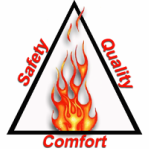FACTS
Q: What is carbon monoxide?
A: Carbon monoxide is a colorless, odorless, potentially lethal gas produced as a byproduct when fuels such as natural or propane gas, kerosene and wood are burned. Because it is impossible to see, taste or smell the toxic fumes, carbon monoxide can kill you before you are aware it is in your home.
Q: What can I do to protect myself and my family?
A: Your fireplace should be serviced every year to prevent issues such as: improper burn temperature, which can cause the protective glass in your fireplace to explode; improper venting, which can cause carbon monoxide to leak into your home; and, improper functioning, which can cause a fire to start in your home.
Q: I have a wood-burning fireplace and am trying to decide if I should convert to a gas fireplace?
A: A gas fireplace is an ideal choice for anyone who wants to enjoy the warmth a fireplace provides without the hassle of hauling and storing wood and cleaning ashes. In addition, many states such as Colorado have burn restrictions on wood during the times when you need to use your wood-burning fireplace the most, the colder days of the winter season.
Q: How often should I have my fireplace serviced?
A: Manufaturers recommend having your fireplace serviced yearly in order to ensure your fireplace is working properly, efficiently and effectively. Yearly service will also keep your fireplace venting properly to prevent carbon monoxide from leaking into your home and possibly impacting your family.
HELPFUL LINKS
Hearth, Patio and Barbecue
Association
http://www.hpba.org
National Fireplace
Institute
http://www.nficertified.org/
Q: What is carbon monoxide?
A: Carbon monoxide is a colorless, odorless, potentially lethal gas produced as a byproduct when fuels such as natural or propane gas, kerosene and wood are burned. Because it is impossible to see, taste or smell the toxic fumes, carbon monoxide can kill you before you are aware it is in your home.
Q: What can I do to protect myself and my family?
A: Your fireplace should be serviced every year to prevent issues such as: improper burn temperature, which can cause the protective glass in your fireplace to explode; improper venting, which can cause carbon monoxide to leak into your home; and, improper functioning, which can cause a fire to start in your home.
Q: I have a wood-burning fireplace and am trying to decide if I should convert to a gas fireplace?
A: A gas fireplace is an ideal choice for anyone who wants to enjoy the warmth a fireplace provides without the hassle of hauling and storing wood and cleaning ashes. In addition, many states such as Colorado have burn restrictions on wood during the times when you need to use your wood-burning fireplace the most, the colder days of the winter season.
Q: How often should I have my fireplace serviced?
A: Manufaturers recommend having your fireplace serviced yearly in order to ensure your fireplace is working properly, efficiently and effectively. Yearly service will also keep your fireplace venting properly to prevent carbon monoxide from leaking into your home and possibly impacting your family.
HELPFUL LINKS
Hearth, Patio and Barbecue
Association
http://www.hpba.org
National Fireplace
Institute
http://www.nficertified.org/
